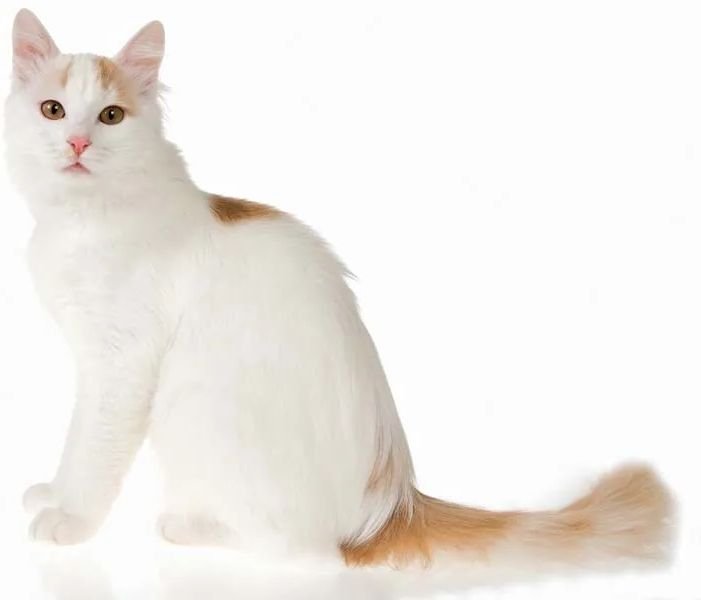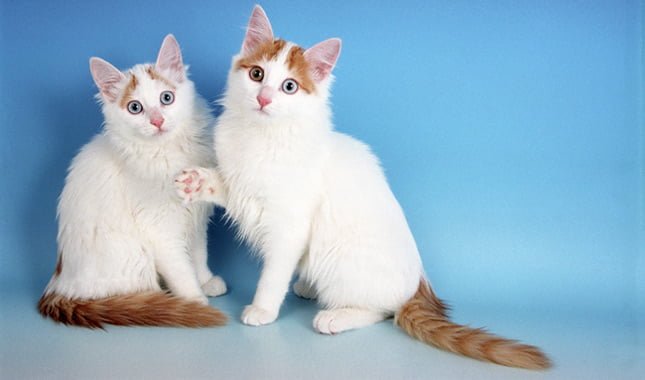
The Turkish Van, also known as the Turkish Vankedesi, is a rare cat breed that was discovered in Turkey in 1955. It is easily distinguishable by its all-white coat and the splashes of color that are seen mostly on the head and tail. The splashes may be red, cream, blue, or black.
The breed is quite rare in the United States – with the CFA reporting that only around 100 of them are registered each year.
They are also known for having peculiar eyes of either a blue or amber color, and sometimes each eye is a different color!
Contents
What Are the Initial Costs of Owning a Turkish Van?
Given the rarity of this breed, finding a kitten is very difficult and there are actually only a handful of catteries located in North America. The breeders that do hold Turkish Vans on their farms will not release or sell kittens without doing a very thorough background check on potential buyers and may even refuse to sell if they do not meet the qualifications.
The Turkish Van cat price is $400 to $1,100. The Oodle Marketplace has many varieties of Turkish Vans, from purebreds to mixed, so check the listings carefully to make sure you understand what you’re buying.
In a worst-case scenario, one of your last options is to seek out breeders from abroad and negotiate for the cat to be shipped once it’s old enough to travel. This option will cost much more, as the buyer is expected to handle shipping costs.
In the UK, News Now Classifieds lists purebred Turkish Vans at £100 to £600 or approximately $129 to $774. On the other hand, Turkish Vans crossbred with other breeds can also be purchased within that range – with the most expensive one being listed at £650 or around $838.
Happy Tails Travel offers domestic pet shipping ranging from $225 to $425, including Alaska and Puerto Rico. Those coming in from other countries will be charged $250 to $500.
These are, however, only initial rates and do not include the cost of the plane ticket, transport to and from the airport, customs fees, and health tests or check-ups. Additional airfare pricing can range from $450 to $3,500 depending on the chosen airline and the travel distance.
Adopting a Turkish Van Cat
Since finding this breed is like looking for a needle in a haystack, you should try to adopt if you see one. Not only can this be your only chance of getting hold of a Turkish Van cat – it being so rare – you can also save a significant amount of money, not to mention giving a cat a permanent place to live and a loving family to look after it for the rest of its life.
If you’re hoping to own a Turkish Van because of its unique look, you’ll be happy to know that there are thousands of rescue shelters across the United States that currently have Turkish Van mixes available to rescue. Although they aren’t purebred, in some cases you’d be hard pressed to spot any physical differences.
Some of the most common mixes are Siamese and Turkish Van, American Shorthair and Turkish Van, and Tabby and Turkish Van.
You can search at Adopt-a-Pet to find shelters near you that have Turkish Van mixes available to rescue. The adoption fee is more or less around $75 to $150. Adoption fees often include the cost of spaying/neutering, vaccinations, medical care, and other necessities such as food, bedding, leashes, collars, grooming, and more.
PetFinder also lists plenty of Turkish Van mixes.

What Additional Costs Can You Expect to Shoulder?
There are certain major diseases and health conditions that most felines are predisposed to, and in many cases these are genetic. Turkish Vans, in particular, are susceptible to obesity, dental disease, bacterial and viral infections, and heart disease.
In order to detect any potential health issues that may be affecting your cat, vet check-ups and physical examinations are required once or twice a year. The cost of such visits along with additional health-related services at a center like Cotner & Superior Pet Care in Lincoln, NE ranges from $9.95 to $69.
This pet clinic in particular charges a monthly recurring fee depending on the chosen plans, which cover a wellness exam, vaccinations, various health tests, and spaying/neutering.
Maintaining a good nutritional profile for your Turkish Van will entail picking out the right food. First and foremost, never forget that cats are carnivorous, so their meals should be composed primarily of meat.
Taste of the Wild Rocky Mountain Premium is a good grain-free dry cat food that is packed densely with nutrients and should fulfill your Van’s health requirements. You can buy a 15-lb. bag for about $31.
Traveling with your new pet can be fun, but also potentially costly. Besides the airplane ticket, expect to spend additional funds on a travel carrier, a health certificate, and other flight accessories for your Turkish Van.
As far as transportation goes, carrying your kitty in the cabin is best when using the PetLuv Happy Cat pet carrier which costs $72.
A health certificate is required by most airlines and should be acquired a week prior to the flight. It proves that your cat is free of rabies and other contagious diseases and is fit for travel.
According to the Animal and Plant Health Inspection Services which is a part of the United States Department of Agriculture & Plant Health Inspection, the cost of a health certificate with no tests taken costs $38. Prices may range up to $173 depending on whether any additional tests are needed.
Don’t forget to have your cat licensed in your state as soon as it’s able to. This is needed to stay in compliance with state and county laws.
The cost of a license is different in each state but usually ranges from about $5 per year to $72 per year. A license sometimes comes with a tag and a microchip in certain areas.
It’s always good to keep an extra amount of money in an emergency fund in case the need arises. This can be used to cover hospital bills and medical expenses which aren’t covered by any insurance policies that you may have in place for your kitty.
Turkish Van Buying Guide
Since Turkish Van breeders in the United States are so few, finding a good cattery can be especially tricky. How can you tell if you’ve found a good one? Are there any red flags to keep an eye out for or any indicators?
The checklist below covers most of the essential traits that you should be looking for in a responsible breeder, as well as tips on making the best buying decisions:
- They should provide a health guarantee that’s good for at least one year, in case you need it
- Check the living area and ensure that the cats aren’t living in cages – they don’t do well in cramped quarters
- Kittens should be registered with either the CFA, TICA or the ACFA (or all three of them)
- When calling a cattery to inquire about a litter, be wary if a kitten is available as soon as you call – most reputable breeders will have potential buyers join a waiting list as Turkish Vans only have a couple of litters each year
- Also, watch out if a breeder is selling a kitten at a “cheaper” price – a breeder might be minimizing cost by providing less care to the animal
- Don’t buy the runt of the litter just because you feel sorry for it
- Check your purchase carefully for any ticks, fleas or other parasites – these need to be reported to the breeder immediately and you may demand compensation.
